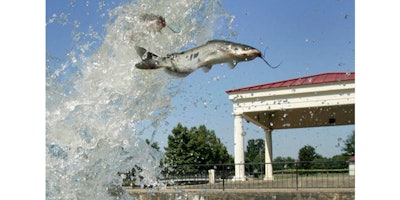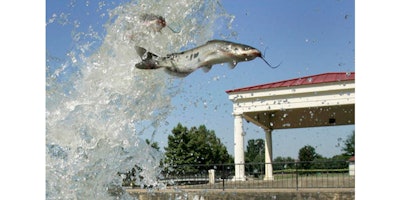
 Associated Press
Associated Press|
JACKSON, Miss. (AP) — In an industry that's lost over half of its jobs in the past decade, Mississippi's catfish farmers have by no means given up to heated competition from abroad. Rather, the state's catfish farmers, which produce over half of U.S. farm-raised catfish, labor daily under strict safety inspection laws while fighting to make sure their industry rivals in Asia are held up to the same standards. After an eight-year battle, American catfish farmers rejoiced when the U.S. Department of Agriculture took over the catfish inspection program from the Food and Drug Administration in March to increase food safety of Asian catfish-like species imports, mostly from Vietnam and China. The program was first authorized in the 2008 and 2014 Farm Bills but struggled to receive funding from Congress. It wasn't implemented until March. "We're mainly interested in a level playing field that provides a wholesome product," said Ben Pentecost, a Mississippi catfish farmer and president of the Catfish Farmers of America. "We don't want to be undermined by a cheap substitute that's not safe." Since the new program was implemented, the USDA halted two Vietnam catfish shipments contaminated with carcinogens. While U.S. catfish farmers were inspected rigorously under the FDA program, the FDA, due in part to funding and staffing, inspected less than two percent of all foreign seafood imports, according to catfish industry specialist Jimmy Avery, a professor with the Mississippi State University Extension Service. Avery said that less than 0.2% of those shipments underwent lab work for drug residues or microbial contamination. Yet when President Obama visited Vietnam last month to bolster diplomatic ties, Sen. John McCain, R-Arizona, introduced a resolution that would return the inspection program to the FDA. Despite opposition from Mississippi senators Thad Cochran and Roger Wicker, the resolution passed in the Senate. Mississippi's four representatives have signed a letter with other legislators asking House leaders to not consider the resolution. McCain and other opponents of the USDA program say it is hurting trade relations with Vietnam and costing taxpayers "millions." The Government Accountability Office has reported that the implementation of the USDA catfish inspection program will cost the industry and the federal government $14 million annually, while the FDA's program cost $700,000. "It's not wasteful spending," Roger Barlow, president of The Catfish Institute, told The Clarion-Ledger. "The only true, safe catfish comes from U.S. farms." "We are working to inform consumers that this is not a trade issue; it's a food safety issue," added Barlow. The USDA program is designed to go into full effect in September 2017 when all shipments of imported catfish, which make up 70 percent of catfish purchased in the U.S., will be inspected. Already, farmers in the U.S., which produce more than 300 million pounds of catfish annually, are experiencing the full weight of the program, with inspectors assigned to every catfish processing plant to oversee daily food safety issues that involve pest control, the packaging of products, sanitation procedures and general employee practices. In Belzoni, a sign welcomes drivers to the "Catfish Capital of the World." But outside of the town and throughout the region, there are many dry ponds long emptied of fish and water. Some of those ponds have been converted into fields, a visual sign of how much the industry in the state has been affected. Avery has studied the decline and says it can be attributed to the appeal of low-cost products provided by an increased number of competitors abroad, rising prices of catfish feed of corn and soybeans, and finally, a weakened economy. Avery said that since the early 2000s, 111,500 acres of catfish were farmed in Mississippi when catfish was the fourth-largest product for the state, right behind poultry, timber and cotton. Today, there are only 39,000 acres of catfish, but there are still 4,000 jobs associated with the business, keeping it still a big industry in the state, said Avery. In recent years, the industry has stabilized due in part to the fact that feed prices have declined, he added. In the heart of the Mississippi Delta in Yazoo County, Simmons Catfish, one of the largest of the catfish processing plants and farms, stands as a beacon for where the U.S. farm-raised catfish industry holds strong. Here, employees run off a motto that "quality is everybody's business." Owner Harry Simmons broke into the catfish business more than 30 years ago and spends almost all of his time working to instill in his employees a sense of pride in the work that they do and in the quality of the product they produce. It's a factor that makes the Simmons brand so popular, as it is distributed to grocers and restaurants across Mississippi and in other states. Jay Bridges, who owns and operates Jerry's Catfish House in Florence, says Simmons is the only brand he buys because he wants the best quality product for his customers, who, as Bridges puts it, return to his restaurant time and time again out of the expectation for a locally grown product. "If there's a demand for it, there's going to be a market for it," said Bridges. With plans to entrust the business into the hands of his daughter and son-in-law, Katy and Andy Prosser, who work at the catfish plant with him, Simmons remains optimistic about the domestic catfish industry. "We've had to weather a lot of challenges, and I feel like, now, we're positioned for some growth," Simmons said. "We'll have to see where that takes us." |





















